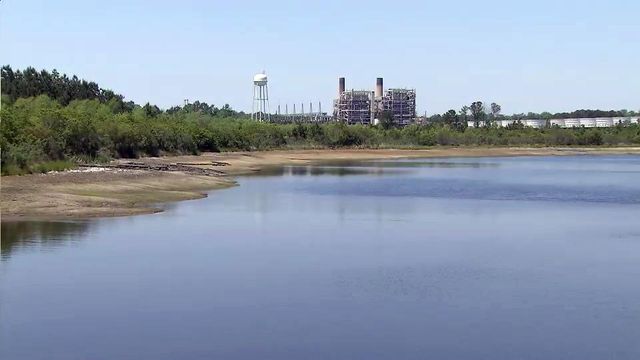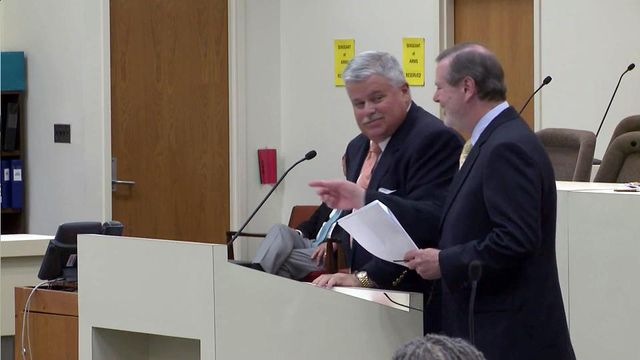Coal ash cleanup bill gets once over from Senate panel
Senators got their first look Monday at a bill aimed at closing dozens of coal ash ponds across North Carolina in 15 years, and several said more work needs to be done before the proposal is put to a vote.
Posted — UpdatedThe Senate Agricultural, Environment and Natural Resources Committee plans to continue refining the bill on Tuesday, and it could reach the Senate floor by the end of the week.
"I think we're going to be setting the trend for the rest of the country when dealing with coal ash," said sponsor Sen. Tom Apodaca, R-Henderson, adding the legislation contains the strictest regulations for ash ponds in the U.S.
Under the proposal, Duke Energy would have to remove ash by August 2019 from four "high-risk" locations, including the site near Eden where about 39,000 tons of ash spilled into the Dan River four months ago. The state Department of Environment and Natural Resources would have to assess 10 other sites and decide whether each is high, intermediate or low risk.
High-risk locations would have to be cleaned up on the same timeline as the Dan River and three other high-priority locations. Duke would have to remove the ash from intermediate-risk ponds by August 2024, but the bill would allow Duke to drain the water from low-risk ponds and either remove it or "cap" the location, essentially sealing in the ash, by August 2029.
"The timelines are pretty aggressive," said Sen. Tommy Tucker, R-Union, asking whether Duke would be given any leniency if weather or other circumstances made it difficult to meet the schedule set out in the bill.
"We tend to work better on deadlines – hard deadlines," Senate President Pro Tem Phil Berger said. "While it’s an aggressive schedule that we have, it’s our belief that those deadlines can be met. This is a problem that has been in place for a long period time. ... I think we'd be doing less than we need to do if we adopted anything other than a fairly aggressive schedule."
Sen. Fletcher Hartsell, R-Cabarrus, noted, however, that the bill doesn't include any sanctions if Duke doesn't meet the deadlines.
"Deadlines are only useful if they're enforceable," Hartsell said.
Environmentalists criticized the lack of sanctions and the idea that Duke could leave the ash in drained ponds, some of which have leaked toxins into nearby groundwater.
"This will not resolve the groundwater contamination problems," Mary Maclean Asbill, an attorney with the Southern Environmental Law Center, told lawmakers.
"We see this bill as a burn-the-public bill written by Duke Energy lobbyists," said Nicholas Wood, organizing director of NC WARN, a utility watchdog group. "This just does not go far enough. It also leaves the public at the mercy of agencies who have demonstrably failed to look after us over the years."
Wood was referring to DENR, which has been involved in litigation over its regulation of ash ponds, and the state Utilities Commission, which would determine whether Duke could pass along any of its cleanup costs to customers through higher electric rates.
The bill would prohibit Duke from passing along the cost of the Dan River spill or any future ash spill, and it places a moratorium until next January on rate increases related to the cleanup of the 13 other coal ash sites to give the state time to study the impact of cleanup plans developed by Duke and DENR as well as new federal rules scheduled to be put in place later this year.
A new nine-member commission would work with DENR to oversee the process of cleaning up the ash ponds. Utilities would be charged fees to pay for four staff members at the commission and 25 inspectors at DENR.
DENR Secretary John Skvarla gave the Senate bill a thumbs-up, saying it expanded on the foundation Gov. Pat McCrory put in place two months ago when he proposed an extensive cleanup of the ash ponds. Lawmakers said they wanted a tougher bill that didn't wait on Duke to submit plans before setting deadlines.
Duke is still reviewing the legislation but is worried about the tight deadlines, spokesman Jeff Brooks said. He said more flexibility is needed for the utility to draft the best plan to address each site.
"What the impact will be on operations, we still have to determine, but it will be a significant impact," Brooks said.
The bill also requires Duke to find other ways to handle the leftover ash, an aspect Apodaca called key to the proposal.
"We’ve got to have other answers for coal ash," he said. "The plain fact is we just don’t have enough room to bury it at this point."
Tucker and Hartsell said the legislation should require the state Department of Transportation to use the ash wherever possible for paving, and others said the construction industry also could employ some of the ash.
Related Topics
• Credits
Copyright 2024 by Capitol Broadcasting Company. All rights reserved. This material may not be published, broadcast, rewritten or redistributed.






